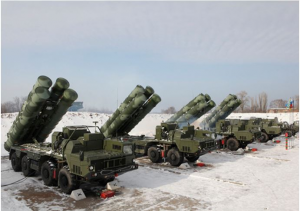CAATSA
About CAATSA
- The Countering America’s Adversaries Through Sanctions Act (CAATSA) is an act made by the US legislature which mandates the U.S. administration to impose sanctions on any country carrying out significant defence and energy trade with sanctioned entities in North Korea, Iran and Russia.
Why in News?
- The U.S. has imposed sanctions on NATO-ally Turkey for its purchase of Russia’s S-400 missile defence system under the Countering America’s Adversaries Through Sanctions Act (CAATSA).
- Last year the U.S. had removed Turkey from its F-35 jet program over concerns that sensitive information could be accessed by Russia if Turkey used Russian systems along with U.S. jets.
- Turkey has responded saying that it will not step back from its decision to deploy Russian air defence systems despite U.S. sanctions.
CAATSA and India
- India and Russia signed a $5 billion contract for the procurement of S-400 air defense systems during the 2018 annual bilateral summit. India is set to get the consignment of the S-400 air defence system early next year.
- While India has got a waiver from the outgoing Trump administration, New Delhi hopes that the incoming Biden administration would not work towards reversing the decision.
India-U.S. Relationship
- The US sees India as a major market for the US defence industry. In the last one decade, it has grown from near zero to USD 15 billion worth of arms deals.
- Since 2008, the US has bagged more than $15 billion in arms deals including for the C-17 Globemaster and C-130J transport planes, P-8 (I) maritime reconnaissance aircraft, M777 light-weight howitzer, Harpoon missiles, and Apache and Chinook helicopters.
- In percentage terms, the US share of Indian arms imports total 23 per cent in terms of the number of contracts and 54 per cent by value.
- India was designated a “Major Defence Partner” of the U.S. in 2016 and it was granted Strategic Trade Authorization tier 1 status in 2018. These designations allowed India easier access to sensitive U.S. defence technology.
- Both countries are also coming together on Indo-Pacific strategy and the newly renewed Quad platform.
- With this context in mind, several U.S. lawmakers who favoured a close U.S.-India relationship, made a strong case for a CAATSA waiver for countries like India (and also Vietnam and Indonesia), which had historically bought Russian arms but were now buying more U.S. arms.
What is the S-400 air defence missile system?
- The S-400 Triumf, (NATO calls it SA-21 Growler), is a mobile, surface-to-air missile system (SAM) designed by Russia.
- It is the most dangerous operationally deployed modern long-range SAM (MLR SAM) in the world, considered much ahead of the US-developed Terminal High Altitude Area Defense system (THAAD).
- The system can engage all types of aerial targets including aircraft, unmanned aerial vehicles (UAV) and ballistic and cruise missiles within the range of 400km, at an altitude of up to 30km.
- The system can track 100 airborne targets and engage six of them simultaneously.
- The S-400’s mission set and capabilities are roughly comparable to the famed US Patriot system.
- The S-400 can also be integrated into the existing and future air defence units of the Air Force, Army, and the Navy.

Why does India need it?
- From India’s point of view, China is also buying the system. In 2015, Beijing signed an agreement with Russia to purchase six battalions of the system. Its delivery began in January 2018.
- China’s acquisition of the S-400 system has been viewed as a “game changer” in the region. However, its effectiveness against India is limited. According to experts, even if stationed right on the India-China border and moved into the Himalaya mountains, Delhi would be at the limit of its range.
- India’s acquisition is crucial to counter attacks in a two-front war, including even high-end F-35 US fighter aircraft.
Reference:
Subscribe
Login
0 Comments
